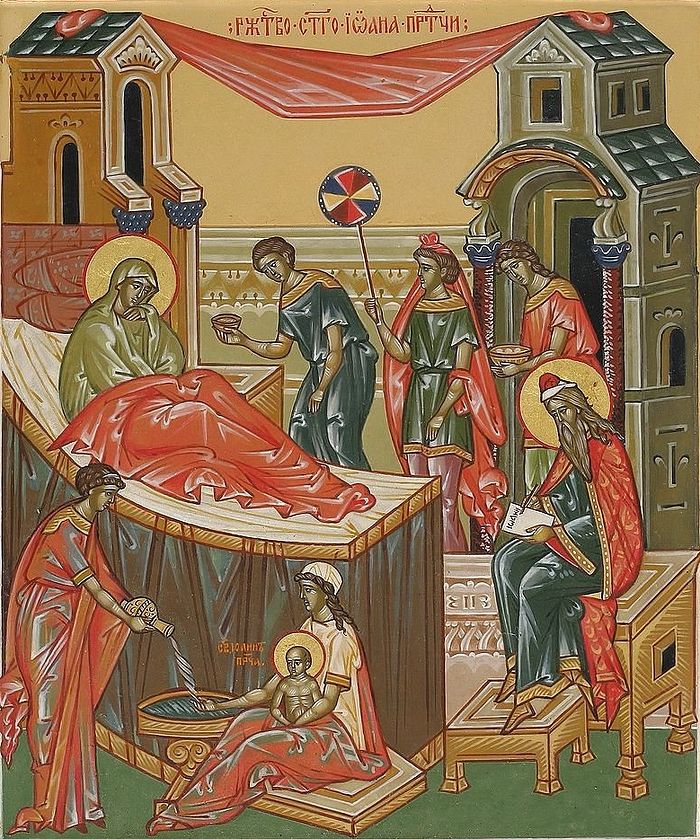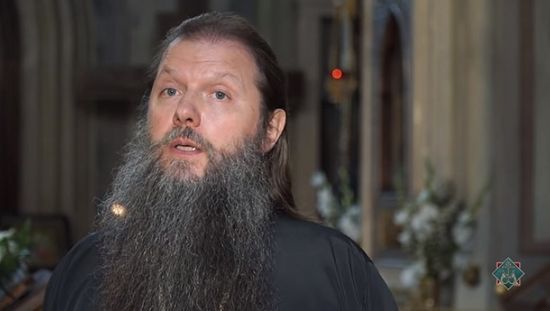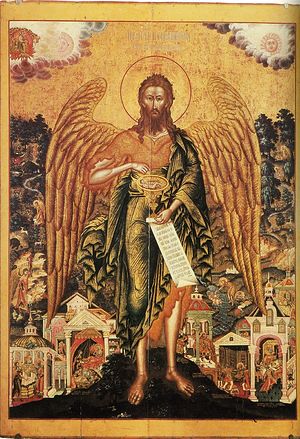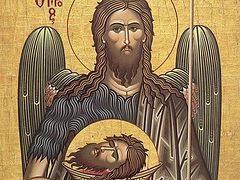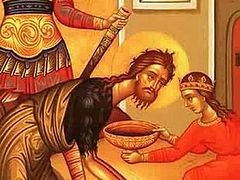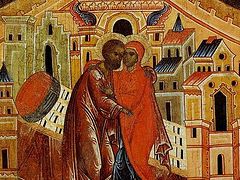Today, dear friends, the eyes of the whole cosmos are fixed upon the humble abode of the Old Testament Biblical righteous—of the priest Zacharias and his meek and silent wife Elizabeth, who received an unexpected joy out of the blue: their firstling, named John as per revelation from above, was born.
During the long years of their common life, being faithful to one another even in thought, they prayed and supplicated the Creator to grant them the joy of a child. The years passed, decades, and little by little the hearts of these wonderful people, unbeknownst to the world, were reconciled to that they would have to depart for the other world childless. But hope, as they say, dies last. And Zacharias received the news in the altar, from an angel, that the hope of the spouses would be fulfilled. They, not believing their happiness, hid themselves. And at the appointed time, the child appeared into God’s world.
This whole story speaks about how important and precious in the eyes of the Creator is the life of even one newborn. What great Providence of God is opened upon every one of us if our parents are smart enough to devote their child to God from the womb of the mother, and if they invest in their child all their love, desiring that he, having become firmly established and entering into reason, would devote himself to the service of the Lord.
With St. John the Forerunner, as Tradition reports to us, were connected astounding miracles, not fitting into the conception of ordinary human fate. Soon after his birth—six months later—in this world appeared Jesus the God-Child. The raging Herod, urged on by demons, fulfilled his inhuman desire to deliver himself from the “pretender to the throne” and committed the terrible tragedy of the slaughter of the innocents, when several thousands of young children, gathered for the world census, were delivered over to death. But protected by God, John was hidden in the desert. He was left an orphan, but the Lord guarded the youth. Even now we know of remarkable cases, we hear witness of them, when after an earthquake there are babies still alive under the rubble of houses; as a tornado that has settled down to disrupt human life, but sidesteps around such innocent, pure beings, for whom someone is praying to God. Thus St. John, deprived of parental care, was preserved by a super-essential power, deer coming to him nourishing him with warm milk, and he, seeing no human face, bit by bit increased in wisdom, was fortified in prayerful striving towards the Almighty, and unlike Mowgli or some children stolen by gypsies, not only did he not lag behind the development of other children, but he was led by the Holy Spirit, strengthened for an exceptional service which the Evangelist Luke, depicting in detail the Nativity of John the Baptist, likened to the service of the prophet Elijah.
Yes, truly, the child should have appeared at the waters of the Jordan in order to preach in the desert in the spirit and power of Elijah. Ancient Christian commentators, contemplating upon this expression, say that, not convinced to do so by anyone, in the longing of his conscience, he brought before God a vow of celibacy, rare in the Old Testament. Along with that, his lips were anointed with a special strength of conviction and knew no partiality or flattery as he never lived in earthly settlements. St. John, upon coming of age, will, without further ado, denounce the Sadducees and Pharisees hardened in pride and lust of power, will bring to trembling with one word the austere and cruel soldiers, curbing their covetousness and acquisitiveness. Performing baptisms in the waters of the Jordan, bringing to the streams of the Jordan hundreds of people, he will confess each one of us, reminding of our previously committed sins. And yesterday’s harlots and publicans, scorned by the whole of society, will join to the disciples of John, in order to see Jesus, having come to the banks of the Jordan at the age of thirty according to the will of the Heavenly Father.
The Nativity of John the Baptist is an event of global-historical significance. Today, rendering honor to this greatest of all prophets of the Old and New Testaments, let’s recall for ourselves particular utterances, emanating forth, as waves, as the sun’s rays from his mouth, so that, having gathered these words, having proven themselves more valuable than gold and precious stones, we, firstly, would render glory to this prophet of Christ, and secondly, joining with the number of those who were obedient to John, the preacher of repentance, we would be, in this way, worthy of his favor and prayer. After all it is no coincidence that on several icons St. John is imaged with wings from his back. An angel of the desert, he protects monastics living in seclusion away from bustling cities, and pious Christians who are saving themselves within the fold of a family. Therefore his guidance helps us today to nourish our hearts, as with spring water and delicious wheat bread. For the soul of man lives not on simple food, but on the words coming from the mouth of God.
First and foremost we recall that calling heard by ten cities of the Jordan, by Jerusalem and the surrounding villages. When the sound of the word of John reached simple artisans, fishermen and those fulfilling military service, then the majority of people with simple and gentle hearts stopped immediately in their tracks and cast off their work, and merchants with baskets and goods laid out for sale went to the Jordan to fulfill those things commanded by the prophet. His appearance struck the imagination. In clothes of camel hide, with a leather girdle upon his loins, he looked afar, from where Christ the Savior should arrive and reveal Himself to the Jews. Every one of his words were penetrated with such love, such incriminating strength that his attentive listeners were literally reborn: Repent for the Kingdom of Heaven is at hand. The word “repent” burns with fire the soul fierce with pride, lust and anger. For the Kingdom of Heaven is at hand said John the Forerunner, commanding his hearers to free themselves from passions and vices and to become as children, for the Kingdom of Heaven is not in food, nor in drink, but in the Holy Spirit, Whose fruit is peace, joy, purity, love, longsuffering… And every one of us, perceiving the word as guidance towards action, are called daily to resurrect in our memories the calling of John: Repent for the Kingdom of Heaven is at hand!
Nothing unclean will enter into Christ’s Kingdom of truth and love. Looking back on our lived years, we are called to reveal the shortcomings of our souls, to deeply repent, and without concealment to show our wounds to a spiritual doctor—to a priest, drawing forth repentance in the power of the Spirit which helps us all to resist sin, to cling to the good—the Living God, to depart form evil towards goodness, and from darkness to light.
St. John the Forerunner, gazing upon Christ, testifies: Behold the Lamb Who takes away the sins of the world, the straps of Whose sandal I am unworthy to loose. These words testify that every one of us, disciples of Christ, must humble ourselves before our Savior, as children before their father, students before their teacher, as the earth before the heavens, as creation before the Creator. We must have great awe before the Savoir, walking before His countenance, and the conviction that the Savior permeates with His Divine gaze our hearts and sees our souls as in His hands, having the willingness with childlike trepidation to fall at the footstool of the Redeemer with faith that He, the Lamb of God has the authority on earth to forgive men’s sins and to renew our souls. Here is the testament of faith, loyalty and love for the Lord, which St. John the Forerunner carried throughout his whole life, having paid for his confession of faith with the shedding of his own blood, which is why he is called by the Church the first martyr by grace.
And the last thing about which we will speak on this day of the Nativity of St. John the Forerunner, and his word will sober those who revel in the juices of this sinful world, who slumber in relaxation, esteeming themselves as if immortal in our sublunary world. And now also the axe is laid unto the root of the trees: every tree therefore which bringeth not forth good fruit is hewn down, and cast into the fire, says John the Forerunner, terming the human soul a tree, and the axe the hour of death unknown by all of us. “Memento mori”—“remember death,” as the ancient sages taught. Never did a human word illuminate with such clarity the truth of the frailty and brevity of our lives, illuminate the truth of impartiality at the Judgment at which we all will stand in order to give an account for all.
Our Savior, to Whom John the Baptist hands over all his disciples, God, in Whom he teaches to believe, our Interlocutor, says: Thou fool, this night thy soul shall be required of thee: then whose shall those things be, which thou hast prepared for the next twenty years?
Therefore, glorifying the Nativity of John, the Baptist of the Lord, we will daily turn to these precious droplets of his words, having gathered them in a jewel box, that their invisible light might ferment our thoughts, feelings, and meditations.
Repent! Repentance is the beginning and end of our being pleasing to God. Don’t delay until tomorrow your repentance which will be useful for you today, as a Damocles’ sword of Divine truth lies already a long time at the root of our lives. The axe of death can instantaneously relocate us from the earthly world to the eternal, where there is no longer place for repentance, but a place only for the impartial Judgment. So as not to be shamed in that hour when the books are opened and everyone will be tested according to what is written therein, it is fitting, according to the testament of John the Forerunner, here, on earth, to fasten our gaze upon the Lamb—Jesus Christ, Who takes to Himself the sin of the world. It is fitting to receive from Him not the baptism of John, but the Baptism of Christ, celebrated with fire and the Spirit, and, being reborn in that saving font, to embrace the seeds of grace. As St. John the Baptist, it behooves us by word and deed to testify to the whole cosmos of the saving faith in Jesus Christ, crucified and risen. In Jesus Christ, Who has sent down upon us the grace of the Holy Spirit, building with living stones the edifice of the Church—the pillar and ground of Truth.

